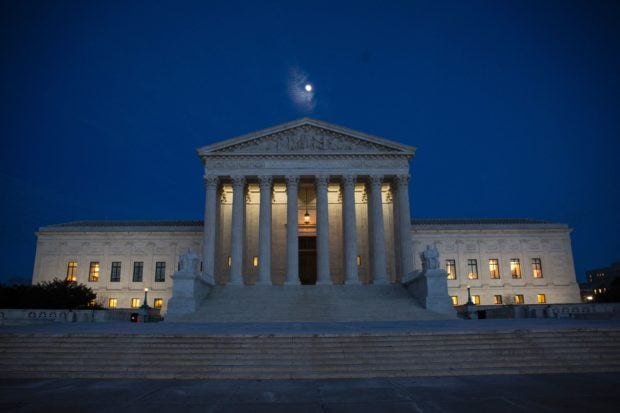The U.S. Supreme Court is poised to consider a major challenge that could reshape how voting maps are drawn, potentially giving Republicans a significant advantage in upcoming elections.
The justices agreed Friday to expand a Louisiana case and weigh arguments about whether the 1965 Voting Rights Act still justifies creating districts specifically designed to elect Black or Hispanic representatives. The case will examine whether racial considerations should play a role in redrawing electoral maps.

The US Supreme Court is pictured January 9, 2017 in Washington, DC. (Photo credit: ZACH GIBSON/AFP via Getty Images)
A ruling that limits the application of the Voting Rights Act could have effects on congressional and local legislative districts across the country, particularly in the South. A decision that limits race-based districting could benefit the GOP, helping it recover the one seat it lost in Alabama and Louisiana due to court-ordered redistricting in the last election cycle. It could also open the door for Republicans to pick up additional seats in other Southern states where district lines have been drawn with racial considerations in mind.
Currently, the U.S. House includes 11 majority-Black and 31 majority-Hispanic districts, according to a Bloomberg News analysis of 2022 data. Republicans expanded their Senate control in the last election, winning 53 seats compared to the Democrats’ 45, with two Independents caucusing with the latter. Republicans currently hold an eight-seat majority in the House, a margin that includes vacancies created by the recent deaths of three Democratic lawmakers. (RELATED: ‘We’re Going To Defy History’: Mike Johnson Makes Bold Prediction About GOP’s Future)
The Supreme Court case unfolds amid renewed redistricting battles in the South, including a brewing showdown in Texas. Texas Democrats are once again weighing whether to flee the state to block a GOP-led redistricting push ahead of the 2026 midterms, mirroring their dramatic walkout in 2003. That year, over 50 Democratic lawmakers fled the state to prevent a quorum, but Republicans ultimately pushed through a new map that helped them pick up five House seats in the 2004 elections.
Republican Texas Gov. Greg Abbott already signed off on new maps after the 2020 Census, which shaped the 2022 elections. Democrats currently control just 12 of Texas’ 38 congressional seats—making any further GOP-driven map changes potentially decisive in maintaining or expanding the party’s slim House majority.
All content created by the Daily Caller News Foundation, an independent and nonpartisan newswire service, is available without charge to any legitimate news publisher that can provide a large audience. All republished articles must include our logo, our reporter’s byline and their DCNF affiliation. For any questions about our guidelines or partnering with us, please contact licensing@dailycallernewsfoundation.org.


![Former Bravo Star Charged After Violent Assault Using a Rock-Filled Sock in Tennessee Walmart [WATCH]](https://www.right2024.com/wp-content/uploads/2025/07/Former-Bravo-Star-Charged-After-Violent-Assault-Using-a-Rock-Filled-350x250.jpg)




![Karoline Leavitt Levels CNN's Kaitlan Collins and Other Legacy Media Reporters [WATCH]](https://www.right2024.com/wp-content/uploads/2025/07/Karoline-Leavitt-Levels-CNNs-Kaitlan-Collins-and-Other-Legacy-Media-350x250.jpg)
![Man Arrested After Screaming at Senators During Big Beautiful Bill Debate [WATCH]](https://www.right2024.com/wp-content/uploads/2025/06/Man-Arrested-After-Screaming-at-Senators-During-Big-Beautiful-Bill-350x250.jpg)

![Illegal Alien Walked Free After Decapitating Woman, Abusing Corpse for Weeks [WATCH]](https://www.right2024.com/wp-content/uploads/2025/07/1753013138_Illegal-Alien-Walked-Free-After-Decapitating-Woman-Abusing-Corpse-for-350x250.jpg)






